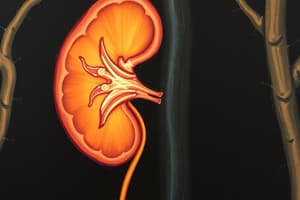Podcast
Questions and Answers
What is the main functional unit of the kidney responsible for filtration?
What is the main functional unit of the kidney responsible for filtration?
- Ureter
- Glomerulus
- Renal pelvis
- Nephron (correct)
Which organ is not a part of the primary excretory system?
Which organ is not a part of the primary excretory system?
- Kidneys
- Pancreas (correct)
- Liver
- Lungs
During which phase of nephron function is sodium chloride (NaCl) actively transported out of the filtrate?
During which phase of nephron function is sodium chloride (NaCl) actively transported out of the filtrate?
- Ascending limb of Loop of Henle (correct)
- Distal convoluted tubule
- Proximal tubule
- Collecting duct
What process in the nephron involves substances moving from filtrate back to blood?
What process in the nephron involves substances moving from filtrate back to blood?
Which statement accurately describes the role of diuretics?
Which statement accurately describes the role of diuretics?
What is the primary function of the proximal tubule in the nephron?
What is the primary function of the proximal tubule in the nephron?
How does the descending limb of the Loop of Henle primarily function?
How does the descending limb of the Loop of Henle primarily function?
What is the final composition of urine primarily influenced by?
What is the final composition of urine primarily influenced by?
Flashcards
Excretory System
Excretory System
A system responsible for maintaining osmotic balance and removing metabolic wastes.
Kidneys
Kidneys
The main organs of the urinary system, responsible for filtering blood and producing urine.
Nephron
Nephron
The functional unit of the kidney, performing filtration, reabsorption, and secretion.
Glomerulus
Glomerulus
Signup and view all the flashcards
Bowman's Capsule
Bowman's Capsule
Signup and view all the flashcards
Filtration (Kidney)
Filtration (Kidney)
Signup and view all the flashcards
Reabsorption (Nephron)
Reabsorption (Nephron)
Signup and view all the flashcards
Secretion (Nephron)
Secretion (Nephron)
Signup and view all the flashcards
Proximal Tubule
Proximal Tubule
Signup and view all the flashcards
Loop of Henle
Loop of Henle
Signup and view all the flashcards
Distal Tubule
Distal Tubule
Signup and view all the flashcards
Collecting Duct
Collecting Duct
Signup and view all the flashcards
Urine Excretion
Urine Excretion
Signup and view all the flashcards
Kidney Function
Kidney Function
Signup and view all the flashcards
Kidney Failure
Kidney Failure
Signup and view all the flashcards
Study Notes
The Excretory System
- Aims to maintain osmotic balance and remove metabolic wastes.
- Includes skin, liver, and lungs – but the main focus is on the kidneys.
- Kidneys filter blood and produce urine, which is waste products.
- Key organs of the urinary system: kidneys (2), bladder (1), ureters (2), urethra (1).
The Nephron
- Functional unit of the kidney.
- Contains a glomerulus (cluster of capillaries) surrounded by Bowman's capsule.
- Blood pressure forces fluid (filtrate) from glomerulus into Bowman's capsule.
- Filtrate contains water, glucose, amino acids, salts, ions, medications, vitamins, and urea.
Nephron Process
- Filtrate travels through the nephron, undergoing reabsorption and secretion.
- Reabsorption: substances move from filtrate back to interstitial fluid (surrounding the nephron).
- Secretion: substances move from interstitial fluid into the filtrate.
- Transport modes: diffusion, facilitated diffusion (passive, no ATP), and active transport (requires ATP).
Proximal Tubule
- Nearest the glomerulus.
- Reabsorption: NaCl, water, glucose, amino acids, potassium (K+), bicarbonate (HCO3-).
- Secretion: H+ ions and ammonium ions (NH4+).
- Important for pH regulation.
Loop of Henle
- Descending limb: aquaporins allow water reabsorption, NaCl remains in filtrate, solute concentration in filtrate increases.
- Ascending limb: thin segment – NaCl diffuses out, thick segment – NaCl actively transported out, filtrate becomes dilute.
Distal Convoluted Tubule
- Reabsorption: NaCl, water, bicarbonate.
- Secretion: H+, ammonium, potassium.
- Contributes to pH regulation.
Collecting Duct
- Filtrate becomes urine.
- NaCl and water reabsorption, regulated by hormones.
- Urea reabsorption by diffusion.
- Filtrate becomes concentrated, urine composition influenced by hydration levels.
Urine Excretion
- Urine from nephrons travels through ureters to the bladder, where it is stored.
- Urine is expelled from the body through the urethra.
Kidney Function and Conditions
- Kidneys play a critical role in maintaining osmotic balance and waste removal.
- Diuretics, medications that act on nephron osmoregulation, can be prescribed for high blood pressure, congestive heart failure, and other conditions.
- Kidney failure can require dialysis (hemodialysis or peritoneal dialysis) to filter blood and support osmoregulation.
- Nephrology is a specialized field focusing on kidney health and diseases.
Further Exploration
- Exploring the specific transport mechanisms used in the nephron.
- Learning about the hormonal control regulating nephron function and urine composition.
Studying That Suits You
Use AI to generate personalized quizzes and flashcards to suit your learning preferences.





